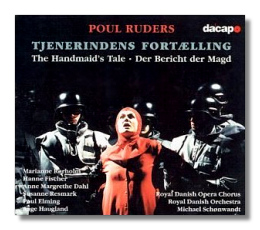
The Internet's Premier Classical Music Source
Related Links
- Ruders Reviews
- Latest Reviews
- More Reviews
-
By Composer
-
Collections
DVD & Blu-ray
Books
Concert Reviews
Articles/Interviews
Software
Audio
Search Amazon
Recommended Links
Site News
 CD Review
CD Review
Poul Ruders

The Handmaid's Tale
- Marianne Rørholm (Offred)
- Hanne Fischer (Offred's "Double")
- Poul Elming (Luke)
- Ull Kudsk Jensen (Offred's Mother)
- Anne Margrethe Dahl (Aunt Lydia)
- Djina Mai-Mai (Moira)
- Lise-Lotte Nielsen (Janine)
- Susanne Resmark (Serena Joy)
- Kari Hamnøy (Rita)
- Aage Haugland (The Commander)
- Gert Henning-Jensen (Nick)
Royal Danish Opera Chorus
Royal Danish Opera Orchestra/Michael Schønwandt
Da Capo 8.224165-66 DDD 2CDs: 77:45, 66:06
Margaret Atwood's chilling novel has been turned into an equally chilling opera, one whose impact it will nevertheless take a long time to assess. Modern operas, with very few exceptions, do not satisfy the urges that send many patrons to the opera house. Even if the endings are sad, as in La Traviata or Madama Butterfly, audiences can take pleasure in the distancing power of operatic spectacle, as well as in the ear-bathing melodies, the celebrities, and the fashions.
Poul Ruders's new work, on the other hand, offers little comfort. Like the novel, it portrays Gilead, a dystopian society not too far in the future. The President and Congress have been shot, and martial law is in effect. Women who still can bear children – natural and man-made disasters have taken their toll on fertility – are compelled to bear them for the society's leaders who cannot. These Handmaids are forbidden to read, to have money, and to be independent. They are the possessions of a man who is not their husband: "Ofglen" can be read as "of Glen," and so on. Handmaids who cannot or will not produce babies become Gilead's refuse. The Handmaid's Tale is the story of Offred. Before Gilead, she had a husband and a daughter. A failed escape attempt separates the three of them, and Offred is sent to the Red Centre where she is indoctrinated by "Aunts" and trained to be a Handmaid. She eventually is sent into the house of The Commander, a powerful man in Gilead's society, and his wife Serena Joy. The opera's plot shows Offred's relationships with the people in her household and with other Handmaidens, and her growing self-awareness through these relationships. Through flashbacks, it also shows her indoctrination in the Red Centre, and snippets of her pre-Gilead life. At the end of the opera, Offred appears to be arrested, but we are not sure whether this is actually the case, or whether she is being smuggled out of the house by an underground resistance movement.
Atwood's novel was adapted into an English libretto by Paul Bentley, and the composer translated this into Danish. It is the mark of a first-class libretto when it is compelling even without music, and such is the case here. Bentley has done a superb job of making Atwood's dark vision work on the operatic stage. His sense of pacing is particularly keen. The long first act comes to a climax with a Handmaid giving birth on-stage (is this a first in opera?), but there is a teasing anticlimax in which Offred and her Commander play Scrabble, a forbidden game for Handmaids. (Is it safe to say that this is the first time Scrabble has appeared in an opera?) Furthermore, his libretto takes advantage of one benefit that opera has over the novel: music can allow several things to happen at the same time. The novel alternates Offred's present with her past, but the opera allows them to coexist, whenever it is dramatically appropriate.
Ruders's largely atonal score pulls no punches. It is brutal, garish, and frightening, but the subject requires nothing less. It lets the voices sing, though, and it knows when to back off, when to let the ear have a moment of rest or of tonal beauty. It is constructed as cunningly as Bentley's libretto; recurring themes and musical symbolism provide a key for interpreting the action on stage. Also, there are many touches of macabre humor, and also of social commentary; Gilead's dogma tends to be assigned music of banal harmonic simplicity. Snatches of "Amazing Grace," "London Bridge," and "Tea for Two" express pathos or irony, as needed. The orchestration is massive, including an organ, digital keyboards, and all kinds of percussion. Annotator Stephen Johnson refers to Ruders as "the Richard Strauss of the computer-age orchestra," and the description is apt.
There's little point in praising individual performers, because there are so many important roles in The Handmaid's Tale, and the casting is uniformly good. However, it must be said that Marianna Rørholm shows incredible skill and stamina in negotiating the title role, which must be the most exhausting in her repertoire. Mention must also be made of Aage Haugland's laconic Commander, and of Ulla Kudsk Jensen, who really must have cut a character on stage as Offred's Mother.
This recording was taped live during the opera's première performances in March 2000. There are some audience and stage noises, but they don't distract. The engineering captures the fright and power in Ruders's music, but not always its warmth. The 266-page libretto contains the Danish text, English and German translations, photos, an introductory essay, a synopsis, and more. There's no better way to be introduced to this provocative opera, short of a DVD, or seeing an actual performance, than this release.
Copyright © 2001, Raymond Tuttle


















